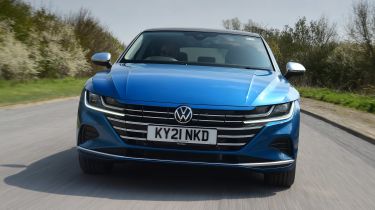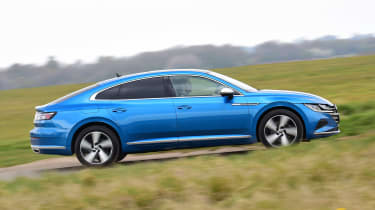Volkswagen Arteon hatchback - MPG, running costs & CO2
With the priority on style, the Volkswagen Arteon isn’t as economical as some VWs
The Volkswagen Arteon offers a choice of three petrol, two diesels and a hybrid option. It shares a chassis with other hatchback and saloon models in the VW Group portfolio, so the Arteon’s engines are modern and well-proven. Eco-conscious buyers and company-car users will appreciate the new plug-in hybrid, introduced as part of the 2020 facelift.
Volkswagen Arteon MPG & CO2
The 2.0-litre, four-cylinder 148bhp turbocharged diesel is amongst the most frugal engines, for company-car owners and private buyers alike. The diesel’s claimed fuel consumption is 55-58mpg depending on spec, and it emits 136g/km of CO2 for a middling Benefit-in-Kind bracket for company-car tax. The 197bhp diesel engine is not far behind, although adding four-wheel drive will negatively affect fuel consumption and BiK rates.
Those who cover a lower annual mileage may be better off choosing the petrol engines. The entry-level 1.5-litre engine returns almost 45mpg, while the 2.0-litre petrol engine manages up to 40mpg and is cheaper to buy in the first place than the diesels. Petrol perhaps isn’t the best choice for business users, as the cheapest sits in a higher tax band than the equivalent diesel, and the 2.0-litre engine in R-Line trim sits in the highest.
While it’s more expensive to buy in the first place, the new plug-in hybrid should offer the lowest running costs if you regularly recharge the battery. Over 200mpg is possible if you drive using the electric mode as much as possible, although that figure also depends on how much driving you’ll do around town. The Arteon has an electric range of up to 39 miles but once that’s used up, it’ll have similar fuel economy to the 187bhp petrol engine.
More reviews
Every Arteon will cost at least the standard annual rate in VED (road tax), but it’ll be easy to send the asking price beyond £40,000 with optional extras. That’s the threshold at which the car becomes subject to an additional yearly payment of more than £300 during years two to six of ownership.
Insurance
The most powerful Arteon models fall into group 32 and insurance companies put the 2.0-litre petrol and diesel variants in groups 22-28. Insurance groups haven’t been released for the plug-in hybrid and R models yet.
Servicing
Arteon drivers can expect enjoyably long periods between scheduled maintenance appointments. Customers can choose from two types of servicing – Fixed or Flexible – with Fixed best suited to low-mileage drivers who make frequent short journeys with lots of cold starts. Here the intervals are every 12 months or 12,000 miles, whichever comes first.
Long-distance drivers who typically drive more than 25 miles a day can opt for Flexible servicing, with the first service arriving after a maximum of two years and 20,000 miles. However, sensors in the car can suggest a service sooner, depending on how the car is driven.
Low maintenance costs are one of the strongest draws of the Arteon and are likely to increase its appeal to corporate users and private buyers alike.
Warranty
The Volkswagen Arteon is covered by the same three-year/60,000-mile warranty as offered elsewhere in the VW Group, with extended warranty options also available for extra cost. This warranty is overshadowed by those from Mercedes and BMW, which place no upper mileage limit in the third year (VW places no mileage limit on the first two years only). It's also considerably less generous than those offered by more affordable brands such as Toyota, Hyundai and Kia, the latter of which provides a seven-year/100,000-mile warranty on every new car it sells in the UK.













